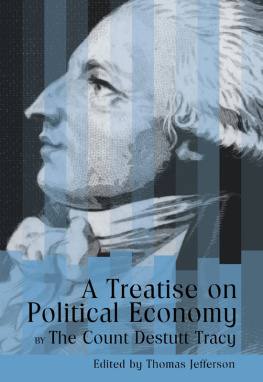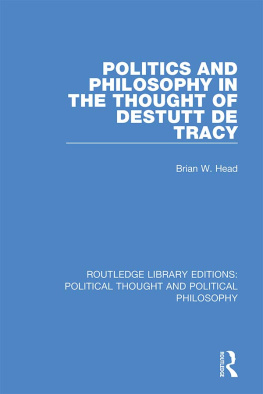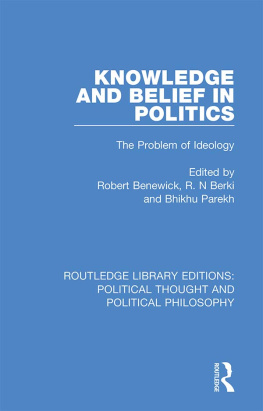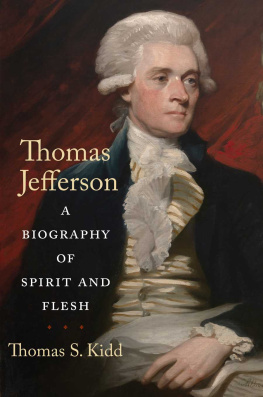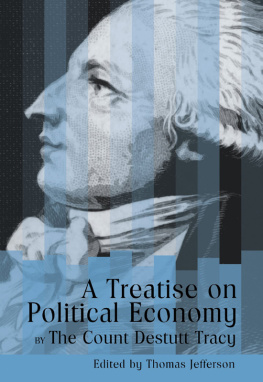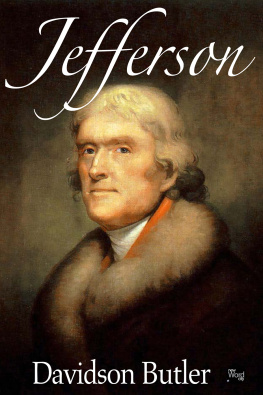A TREATISE ON POLITICAL ECONOMY
A
TREATISE
ON
POLITICAL ECONOMY
TO WHICH IS PREFIXED
A SUPPLEMENT TO A PRECEDING WORK ON THE UNDERSTANDING
OR, ELEMENTS OF IDEOLOGY
BY
THE COUNT DESTUTT TRACY
TRANSLATION EDITED BY THOMAS JEFFERSON
[1817]

First Edition 1817
(Georgetown, D. C.: Published by Joseph Mulligan,
Printed by W. A. Rind & Co., 1817)
Reprinted 1970 by
AUGUSTUS M. KELLEY PUBLISHERS
REPRINTS OF ECONOMIC CLASSICS
New York New York 10001
The Ludwig von Mises Institute
Auburn, Alabama
2009

A TREATISE
ON
POLITICAL ECONOMY;
TO WHICH IS PREFIXED
A SUPPLEMENT TO A PRECEDING WORK ON THE UNDERSTANDING
OR ELEMENTS OF IDEOLOGY;
WITH AN
ANALYTICAL TABLE,
AND AN
INTRODUCTION ON THE FACULTY OF THE WILL.

BY THE COUNT DESTUTT TRACY,
MEMBER OF THE SENATE AND INSTITUTE OF FRANCE, AND OF THE AMERICAN PHILOSOPHICAL SOCIETY.

TRANSLATED FROM THE UNPUBLISHED FRENCH ORIGINAL
GEORGETOWN, D. C.
PUBLISHED BY JOSEPH MILLIGAN.
1817
District of Columbia, to wit:
B E it remembered, that, on the fifteenth day of March, in the forty-first year of the Independence of the United States of America, Joseph Milligan, of the said District has deposited in this office the title of a Book, the right whereof he claims as Proprietor, in the words following to wit:
A Treatise on Political Economy; to which is prefixed a supplement to a preceding work on the Understanding, or Elements of Ideology; with an Analytical Table, and an Introduction on the Faculty of the Will. By the Count Destutt Tracy, Member of the Senate, and Institute of France, and of the American Philosophical Society. Translated from the unpublished French original.
In conformity to the Act of the Congress of the United States, entitled An Act for the encouragement of learning, by securing the copies of Maps, Charts, and Books, to the Authors and Proprietors of such copies, during the times therein mentioned.
G. DENEALE, Clerk of the District of Columbia.
THE ECONOMICS OF DESTUTT DE TRACY
by Timothy D. Terrell
Antoine Louis Claude Destutt de Tracy (17541836), a French philosopher and economist, is worthy of attention as a contributor to French liberal thought in the tradition of Condillac. Tracys deductive methodology, his liberal approach to governmental affairs, and his subjectivism qualify him as a proto-Austrian economist who enjoyed considerable influence not only in France but also around the world. This essay will briefly examine Tracys thought, concentrating on his theory of money and banking and his ideas on government. We will conclude with a review of the effect Tracy had on American Jeffersonian thought.
Ideology and Ideologists, Method, and Subjectivism
Destutt de Tracys economics were an outgrowth of his philosophy of ideology. Ideology, a term coined by Tracy about 1796, was to be a science of the formation of ideas,
In this, ideology sought to replace theology as the dominant unifying system, and, further, to exclude all religious studies whatsoever from the ideological system. Tracys magnum opus was his Elmens didologie (18011815), a four-volume treatment of methodology and philosophy, which consisted of Idologie proprement dite (1801), Grammaire (1803), Logique (1805), and Trait de la volont et de ses effets (1815). His Trait de la volont, or treatise on the will, was enthusiastically accepted by Thomas Jefferson and became the only volume of Tracys Elmens to be translated into English, under the title A Treatise on Political Economy.
Tracys colleagues called themselves ideologists, though the derisive title of ideologues, given them by Napoleon, stuck. These ideologues included Cabanis, Garat, Wenceslas Jaquemont, Jean-Baptiste Say, Franois Thurot, and others. Among Tracys friends were also Dupont de Nemours and the Marquis de Lafayette, through whom he communicated with Thomas Jefferson.
The inception of ideology was at a time of political upheaval in France. Tracys attempts at riding the fence between royalist and Republican were largely unsuccessful. Tracy barely escaped execution during the Reign of Terror, having been imprisoned for nearly a year (November 1793October 1794). The emergence of the Napoleonic empire did not provide the ideologues with lasting security. Though Napoleon courted the ideologues for some time, he began in 1802 to show open hostility to this group whose liberalism stood in opposition to his dictatorial policies. However, the success of ideology was not strictly limited by this domestic opposition, as Tracys ideas found enthusiastic sponsors in the rest of Europe and the Western Hemisphere.
Destutt de Tracy and the ideologues were heavily influenced by Abb de Condillac. Condillacs liberalism and deductive methodology were the foundation of much of Tracys work on economics. John Lockes influence is present in the ideologues thought, notably in Tracys writings on property rights. Clearly, Tracy also followed Jean-Baptiste Say, especially in the subjective-value tradition, but Tracy perhaps anticipated him in his attack on calculation or algebraic expression in the social sciences. In this, Tracy can be effectively distinguished from the French positivists, who, unlike the ideologues, were attempting to employ tools from the physical sciences in the field of social science.
It would be a misunderstanding of ideology to say that its purpose
The mode of analysis is the same in all endeavors: to establish primary principles which come from the most simple ideas which in turn come directly from our sensations. What distinguishes the different sciences is the object being investigated, and the ideologues definitely believed that the social sciences give way to a very differently structured body of thought than do the physical sciences.
Upon the foundation of sensibility, many of Tracys predecessors had hoped to establish an exact mathematical science of human thought. Tracy, however, breaking with Condorcets social mathematics and Condillacs langue des calculs, believed with Locke that much of reality could not be reduced to mathematical constructs. Emmet Kennedy writes,
Through observation and deduction, not calculus or geometry, one could discover the other propositions contained in the original truth, man is a sensitive being, and thereby reduce all the human sciences to a few basic truths. This science of observation and deduction, the analysis of ideas, all ideas, not just mathematical ideas, was ideology to which all the other sciences could be reduced. Ideology itself reducible to none, guaranteed the unity of the sciences.
Destutt de Tracy was also part of the catallactic and subjective-value tradition, which proceeded from Turgot and Say. In his Trait de la volont, he writes (p. 61),
Society is purely and solely a continual series of exchanges. It is never anything else, in any epoch of its duration, from its commencement the most unformed, to its greatest perfection. And this is the greatest eulogy we can give to it, for exchange is an admirable transaction, in which the two contracting parties always both gain; consequently society is an uninterrupted succession of advantages, unceasingly renewed for all its members.
Next page
